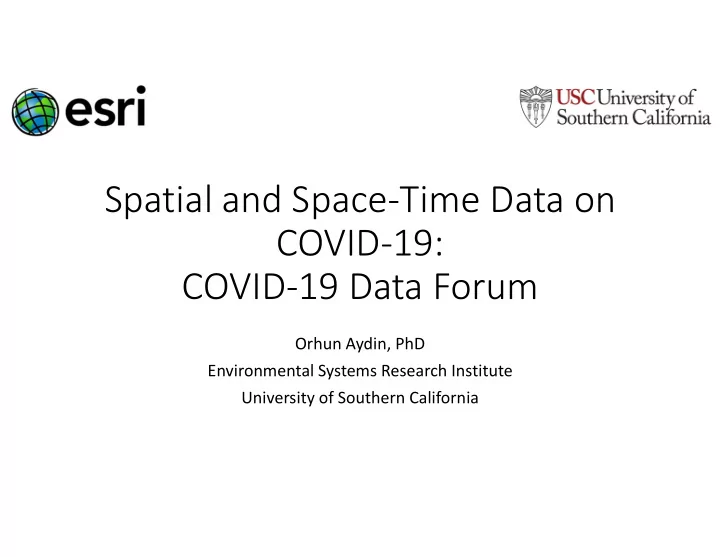

Spatial and Space-Time Data on COVID-19: COVID-19 Data Forum Orhun Aydin, PhD Environmental Systems Research Institute University of Southern California
Evolution in Communicating Pandemics
Steps for Spatial Analysis of COVID-19 Data Map the Cases Map the Spread Map Vulnerable Map Available Communicate Populations Resources • • • • • EPI models Where are they? Hospital Data gathering Reasons behind • • • • Data cleaning Spread timelines Movement Equipment interventions • • • Curation Future of spread patterns Groceries
Challenges Pertaining to COVID-19 Data Uncertainty pertaining to data. Interplay of spatio- Data Uncertainty temporal scale of data and uncertainty County-level, hospital-level, agent-level Varying Scales of Data Sources Spatial and temporal aggregation/representation of Spatial, spatio-temporal representation data. Conforming to Different data sources & types require a wide type Impacts many dimensions of our lives of data representation Serving, consuming & curating live data is Data is dynamic challenging
Data Requirements of Epi Models Epidemiological Models (IHME/CHIME/SEIR/Covid19Surge/…) • Attack Rate • Population • Intervention Types • Hospitalizations Rate • Infection Rate • Demographics • Social Distancing • Death Rate • Incubation Period • Effectiveness • Hospital Stay • Infectious Period • Convalescence Period
Data Requirements for Resource Allocation Personal Protection Equipment Beds/ICU Beds/Ventilators (PPE) Total Resources & Availability Masks, gloves, gowns, … Shortages need to be avoided Used by clinicians to protect from infection • Case Mortality Increases Can be prohibitive for effective staff • Nearby care-providers experience peaks
Resources for Geospatial COVID-19 Data • ESRI Disaster Response Hub • https://coronavirus-disasterresponse.hub.arcgis.com/ • Contains data that is: • Live • Curated • Serves data through a RESTful API • Simple data interaction through R and Python
Sharing & Communicating Analysis
Communicating Analysis • Large number of open-source modeling projects • CHIME – Community-driven, originally from U. Penn • SIR Model • Deterministic and Bayesian models exist • IHME – Institute for Health Metrics and Evaluation • Developed by IHME Group • Bayesian Curve Fitting • Covid19Surge – Developed by CDC • SIICR Model • Planning tool • How to make these communicable?
Spatial Data APIs and R • GeoJSON, Feature Services and Image Services • geoJSONR package • Brings in geoJSON description as R dataFrame • arcgisbinding (R-Bridge) allows seamless interaction to ESRI Feature services that are publicly availably • Works seamlessly with ESRI’s REST API • Data I/O as R Dataframe • https://r-arcgis.github.io/
Data Related Analysis Challenges • Resolving different scales • Data comes in a multitude of scales • Spatial • Temporal • Representing uncertainty in data and models • Community-driven data curation • Enable high-fidelity in data when possible • Challenging for live data
Recommend
More recommend